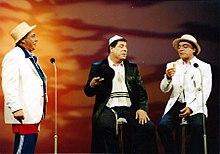Hagashash Hachiver
Hagashash Hachiver ( Hebrew הגשש החיוור) Is an Israeli comedian - Trio . It was founded in 1964 and consisted of Shaike Levi ("Shaike", * 1939), Yisrael Poliakov ("Poli", 1941-2017) and Gavriel Banai ("Gavri", * 1939). Her appearances spanned nearly four decades and covered almost every aspect of Israeli society .
history
At the beginning of the 1960s, Gavri , Shaike and Poli were members of the Hatarnegolim singing group ("The Roosters" or "The Gockel"), which at the time also belonged to Yehoram Gaon and which was led by Naomi Polani. In 1963 the idea arose to form a trio with the three and to interweave spoken sketches between the singing numbers , which over time became increasingly important. The first program, “The Joy of My Age”, was put together in 1964 by Shaike Ophir . Over the years, major Israeli artists have provided lyrics for the trio's performances, including Nissim Aloni , Gavri's brother Yossi Banai , TV man Moti Kirschenbaum and Ephraim Kishon . Musicians who contributed to the programs included Jair Rosenblum and Danny Sanderson.
The group name Hagashash Hachiver , literally "The Pale Tracker ", comes from Paschanel (Avraham Desche, 1926-2004), who founded the group and headed it as impresario throughout its existence . According to the writer Dan Almagor, the expression is said to come from The Last of the Mohicans by James Fenimore Cooper .
The performances by Hagashash Hachiver often had satirical character. In 1977, after Maccabi Tel Aviv won the European Cup, the basketball hype in Israel was targeted. Many of the expressions coined in the process have enriched the Israeli colloquial language and have become stationary expressions, such as the farewell greeting "Drive in peace, the keys are in" (i.e. in the car).
Awards
In 2000, Hagashash Hachiver and his three members received the Israel Prize for their life's work and their special contribution to Israeli society. The jury wrote:
“They (the group) are an expression of contemporary Israeli culture. For decades they have been characterizing figures and situations and thus expressing the diversity of Israeli society. In doing so, they create a special language that has become an inseparable part of contemporary Ivrit. "
Hagashash Hachiver's "special language" is often referred to as Gashashit .
In 2013 Hagashash Hachiver was awarded the Ophir Prize in the Lifetime Achievement category.
Individual evidence
- ^ Don Rubin: The World Encyclopedia of Contemporary Theater: Europe. 1999, p. 513.
- ↑ Reasons of the jury (Hebrew)
- ↑ -it is the common ending for language names in Hebrew: Ivrit , germanit (German), anglit (English), russit (Russian) etc.
- ↑ Video of the award ceremony (Hebrew)

